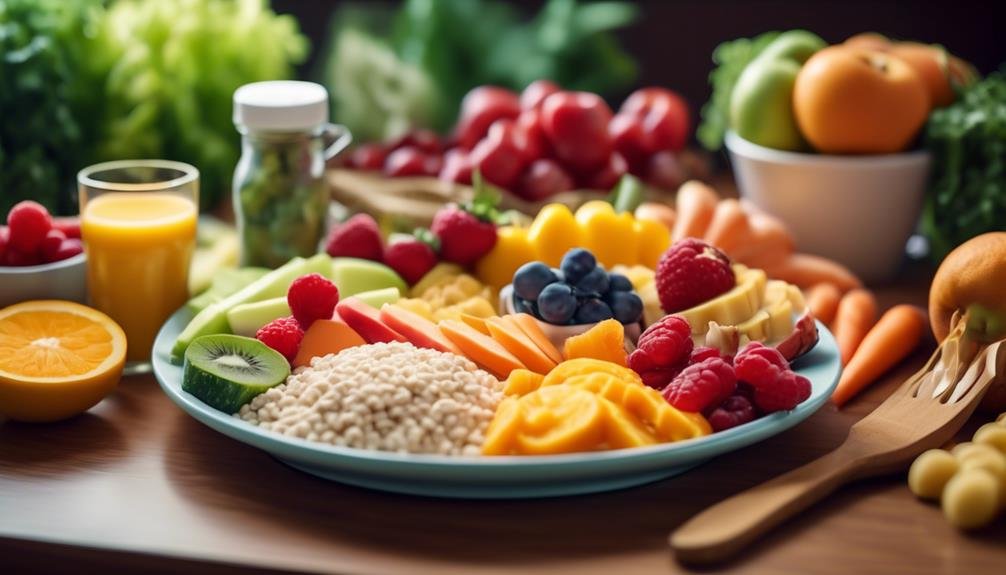"Cherishing Little Steps - A Haven for Baby and Family Journeys"
Healthy Weight for Toddlers
Have you ever wondered what constitutes a healthy weight for toddlers? It is a question that many parents find themselves pondering as they navigate the world of raising a young child.
As a parent, you want to ensure that your toddler is thriving and developing at the right pace. In this discussion, we will explore the factors that contribute to a healthy weight for toddlers.
Understanding growth patterns is an important aspect of determining a healthy weight for your toddler. Every child is unique and grows at their own pace, but there are general guidelines that can help parents understand if their child is within a healthy range.
The importance of balanced nutrition cannot be overstated when it comes to maintaining a healthy weight for toddlers. Providing a variety of foods from different food groups ensures that your child is getting the nutrients they need to grow and thrive.
Portion sizes also play a role in maintaining a healthy weight for toddlers. It is important to offer appropriate portion sizes that are suitable for your child's age and activity level.
Promoting physical activity is crucial for toddlers to maintain a healthy weight. Encouraging active play and providing opportunities for exercise can help your child burn calories and develop healthy habits.
Monitoring your child's weight and growth is essential for ensuring they are maintaining a healthy weight. Regular visits to the pediatrician can help track your child's growth and address any concerns or issues that may arise.
By the end of this discussion, you will have a better understanding of how to establish healthy eating habits for your little one. Stay tuned!
Key Takeaways
- Toddlers typically gain around 4 to 6 pounds per year.
- Balanced nutrition is crucial for a toddler's physical and cognitive growth.
- Offer a variety of foods from different food groups to ensure proper nutrient intake.
- Outdoor play and physical activity promote healthy growth and development.
Understanding Toddler Growth Patterns

Understanding toddler growth patterns is essential for parents and caregivers to ensure that their little ones are developing in a healthy and appropriate manner. Tracking and monitoring your toddler's growth milestones can provide valuable insight into their overall development.
During the first year of life, infants experience rapid growth, with weight doubling by around 5 months and tripling by their first birthday. After the first year, growth slows down, and toddlers typically gain around 4 to 6 pounds per year. However, it's important to remember that every child is unique, and growth patterns can vary.
Factors affecting toddler growth include genetics, nutrition, and overall health. Genetics play a significant role in determining a child's growth potential. Adequate nutrition is crucial for proper growth, and a balanced diet rich in fruits, vegetables, whole grains, and lean proteins is recommended.
Health conditions, such as chronic illnesses or hormonal imbalances, can also impact growth. Regular visits to the pediatrician can help monitor your child's growth and identify any potential concerns.
Understanding your toddler's growth patterns and milestones can give you peace of mind and help you ensure that they're thriving. Remember, every child grows at their own pace, so focus on providing a nurturing environment and supporting their overall well-being.
Importance of Balanced Nutrition
As you focus on your toddler's growth patterns, it's important to recognize the pivotal role of balanced nutrition in their overall development. Providing your child with a well-balanced diet is crucial for their physical and cognitive growth. The impact of nutrition on toddler development can't be overstated.
To ensure your toddler is getting the nutrients they need, it's important to offer a variety of foods from different food groups. A balanced meal should include carbohydrates, proteins, healthy fats, fruits, and vegetables. Some examples of balanced meal ideas for toddlers include whole grain toast with avocado and scrambled eggs, grilled chicken with steamed broccoli and brown rice, or a yogurt parfait with berries and granola.
Proper nutrition has a direct impact on your toddler's brain development, energy levels, and immune system. Nutrient deficiencies can lead to developmental delays, poor growth, and increased susceptibility to illnesses. On the other hand, a well-nourished child is more likely to have better cognitive abilities, physical stamina, and overall health.
Recommended Food Groups for Toddlers

To ensure your toddler receives proper nutrition, it's important to include a variety of food groups in their diet. Here are some meal prep ideas and healthy snack options to help you provide a well-rounded diet for your little one:
- Fruits and Vegetables: Incorporate a rainbow of colors by offering a variety of fruits and vegetables. Slice up some strawberries, blueberries, and kiwi for a colorful fruit salad. Steam carrots, broccoli, and sweet potatoes for a nutritious and delicious side dish.
- Whole Grains: Opt for whole grain options such as whole wheat bread, brown rice, and oatmeal. These provide essential nutrients and fiber. Make a batch of whole wheat pancakes or prepare a bowl of oatmeal with sliced bananas and a drizzle of honey.
- Protein: Include lean sources of protein such as chicken, turkey, fish, and legumes. Cube chicken breast and toss it with some roasted vegetables for a simple and nutritious meal. Alternatively, blend cooked black beans with spices to make a tasty dip for whole grain pita chips.
Remember to offer a variety of foods from each food group to ensure your toddler gets all the nutrients they need. By incorporating these meal prep ideas and healthy snack options, you can help your toddler develop healthy eating habits for a lifetime.
Portion Sizes for Toddlers
Properly portioning meals for toddlers is crucial for their healthy growth and development. Toddler meal ideas and portion control tips can help ensure that your little one is getting the right amount of food to meet their nutritional needs.
When it comes to meal planning, it's important to consider the appropriate serving sizes for toddlers. A good rule of thumb is to offer one tablespoon of each food group per year of age. For example, a two-year-old should be served two tablespoons of protein, two tablespoons of grains, two tablespoons of fruits, and two tablespoons of vegetables.
It's also important to offer a variety of foods to ensure that your toddler is getting a well-rounded diet. Include foods from all food groups and aim for a balance of carbohydrates, protein, and healthy fats. Remember to provide small, bite-sized pieces to make it easier for your toddler to eat.
Encouraging Physical Activity in Toddlers

Encouraging toddlers to engage in physical activity is vital for their overall health and development. Physical activity not only helps them maintain a healthy weight, but also promotes bone and muscle development, improves coordination and balance, and enhances cognitive function.
Here are some ways to encourage physical activity in your toddler:
- Make outdoor play a priority: Take your toddler to the park, go for walks, or play games like tag or catch. Outdoor play not only provides opportunities for physical activity, but also exposes them to fresh air and nature, boosting their mood and overall well-being.
- Set screen time restrictions: Limit the amount of time your toddler spends watching TV or using electronic devices. Excessive screen time has been linked to sedentary behavior and increased risk of obesity. Encourage them to engage in active play instead.
- Lead by example: Be a role model by participating in physical activities yourself. Your toddler is more likely to follow your lead and engage in physical play if they see you being active.
Monitoring Your Toddler's Weight and Growth
Monitoring your toddler's weight and growth is essential for ensuring their healthy development and identifying any potential concerns early on. By keeping track of their growth patterns, you can ensure that they are on track and getting the nutrition they need. One helpful tool for monitoring your toddler's weight is a toddler weight chart. This chart provides a range of weights that are considered healthy for children of different ages.
Here is an example of a toddler weight chart:
| Age (in months) | Average Weight (in kg) | Healthy Weight Range (in kg) |
|---|---|---|
| 12 | 9.5 | 8.5 – 10.5 |
| 18 | 11.0 | 10.0 – 12.0 |
| 24 | 12.5 | 11.5 – 13.5 |
| 36 | 14.5 | 13.5 – 15.5 |
It's important to remember that these are just averages, and individual children may fall outside of these ranges while still being healthy. However, if your toddler consistently falls below or above the healthy weight range, it may be worth discussing with their healthcare provider.
In addition to weight, there are other signs of healthy growth to look out for. These include steady increases in height, development of new skills, and a generally happy and active demeanor. If you have any concerns about your toddler's growth, don't hesitate to reach out to their healthcare provider for guidance and support.
Tips for Creating Healthy Eating Habits

To further support your toddler's healthy development, let's explore some practical tips for fostering healthy eating habits.
- Create mealtime routines: Establishing regular meal and snack times can help your toddler develop a sense of structure and routine. This can also prevent grazing throughout the day and promote a healthier appetite during meals.
- Promote positive food associations: Encourage your toddler to have a positive relationship with food by creating a pleasant and relaxed atmosphere during mealtimes. Offer a variety of nutritious foods and allow your child to explore different tastes and textures. Avoid using food as a reward or punishment, as this can create negative associations.
- Lead by example: Children learn by observing, so make sure to model healthy eating habits yourself. Show enthusiasm for nutritious foods and involve your toddler in meal planning and preparation. This can foster a positive attitude towards healthy eating and encourage them to make healthier choices.
Frequently Asked Questions
How Can I Help My Toddler Develop a Healthy Relationship With Food?
You can help your toddler develop a healthy relationship with food by promoting positive eating habits and using strategies to encourage variety in their diet. It's important to create a supportive and nurturing environment.
What Are Some Common Signs That My Toddler Is Not Getting Enough Nutrients?
If your toddler lacks nutrients, you might notice fatigue, slow growth, or frequent illnesses. Their body is like a car running on empty – it needs fuel to thrive.
Is It Normal for My Toddler to Have Fluctuations in Weight and Growth?
It's totally normal for your toddler's weight and growth to fluctuate. Their appetite may vary due to growth spurts, so don't worry if they seem to eat less sometimes. Trust their instincts!
How Can I Ensure My Toddler Is Getting Enough Physical Activity in Their Daily Routine?
You can ensure your toddler gets enough physical activity by incorporating indoor and outdoor activities into their daily routine. This helps them develop their motor skills, burn energy, and maintain a healthy weight.
Are There Any Specific Foods or Food Groups That I Should Limit or Avoid for My Toddler's Healthy Weight?
To maintain a healthy weight for your toddler, it's important to limit or avoid certain foods or food groups. Focus on portion control and balanced meals. This ensures they get the nutrients they need while avoiding excessive calories.
Conclusion
You hold the key to your toddler's health and well-being.
Just as a gardener tends to their plants, nurturing them with care and attention, so too must you nourish your child's body and mind.
By understanding growth patterns, providing balanced nutrition, and promoting physical activity, you can lay the foundation for a healthy future.
Remember, small steps today lead to big strides tomorrow.
Together, let's cultivate a garden of health for our little ones.



Thank you for your sharing. I am worried that I lack creative ideas. It is your article that makes me full of hope. Thank you. But, I have a question, can you help me?